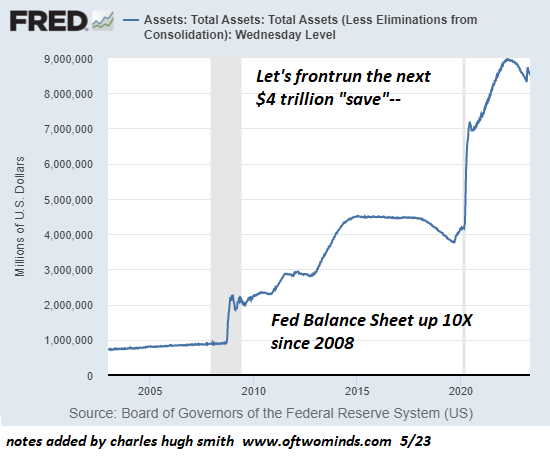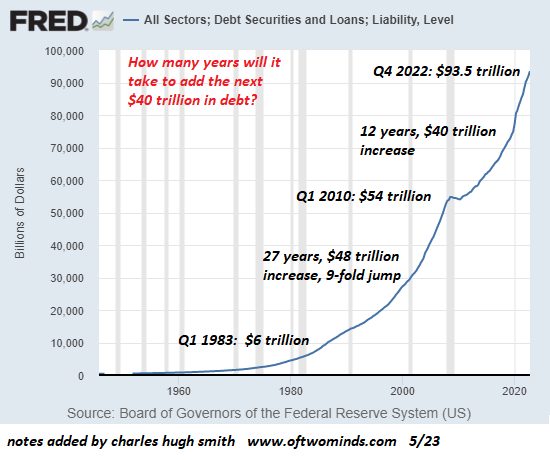The Fed has trained the trading-rats all too well, and there is no way to avoid the unintended consequences of the Fed’s large-scale human behavioral experiment.
The Federal Reserve has been running a large-scale human behavioral experiment since 2008. The results are now in.
Let’s start by stipulating that trading-bots are programmed to trade on human behavioral flows, i.e. trends and reactions to policy announcements and other “news” (earnings beats. etc.). As a result, the robot-trading-rats are responding to the same stimuli as the human-trading-rats in the Fed’s experiment.
Here’s the experiment set-up. When the trading rats hit the red button, the stock market swoons, and the Fed leaps into action to “save the market” by injecting trillions of dollars in stimulus and liquidity through various programs such as buying Treasury bonds. The trading-rats who “buy the dip” are rewarded with hefty gains as the market soars once the Fed “pivots” from “hawkish” to “dovish.”
Trading-rats are smart and so they realized they didn’t need to wait for the Fed to act to reap big gains. Since everyone playing the trading game knows the Fed will pivot dovish once the market swoons, then the trading-rats started front-running the Fed’s pivot, buying every swoon based on their supreme confidence that the Fed would soon “save the market” from crashing.
The Fed is now trapped by the success of its mass-scale behavioral experiment. The trading-rats have such total confidence in the Fed Put, i.e. the Fed “saving the market” once it swoons, because every time they’ve hit the red button the Fed has leaped into action and released a tsunami of stimulus and liquidity that reverses the swoon and pushes risk assets to new highs.
As a result of this feedback, the market never swoons enough to trigger a Fed reaction because every dip is bought by front-running trading-rats. This can be seen as a success, as the Fed no longer has to do anything at all to keep the market elevated, as the front-running trading-rats leap into action to buy every dip. The expectation of a Fed “save” is enough to keep the market in a comfortably elevated trading range.
The problem is the trading-rats’ confidence in the Fed Put incentivizes a near-infinite expansion of moral hazard as the trading-rats can expand debt and leverage without any limit because the consequences (potentially devastating losses) have been taken off the table by the Fed’s “guaranteed” reversal of any swoon in risk assets.
Each trading-rat is focused on its own debt and leverage, but there is no incentive to measure the systemic risk piled up by the Fed-generated moral hazard. The Fed’s “guaranteed” reversal of any swoon has thus created a perverse incentive to take on insane levels of risk to increase gains–a rise in risk that now threatens the stability of the entire financial system.
No one believes a crash is possible because the Fed will reverse the swoon once the trading-rats hit the red button. But the Fed is not omnipotent, and the confidence in its omnipotence has morphed into hubris.
The only way the Fed can break this incentive to increase risky bets is to deliver a shock when the trading-rats hit the red button. Instead of guaranteed gains, the trading-rats receive a shock–massive losses. To re-train the trading-rats behaviorally, the Fed will have to deliver repeated shocks because the trading-rats have been trained to expect Fed goodies every time they hit the red button.
The first time they receive a shock instead of a treat, the trading-rats will be confused but will go ahead and hit the red button again. They will continue to hit the red button and get shocked until they realize the rules of the experiment have changed.
Should the Fed randomly deliver treats and shocks, the trading-rats will enter a catatonic-schizoid state of nervous breakdown. The trading-rats will no longer know what to do, and so they won’t buy every dip to front-run the Fed, and they will no longer be confident the Fed will reverse the ensuing crash.
For the Fed’s part, if they keep rewarding the trading-rats for piling on risk, then the system will become increasingly vulnerable to a cascading collapse due to insane levels of risk that have been incentivized by the Fed’s “guarantee.”
If they stop reversing every swoon, the market is vulnerable to a cascading crash as the trading-rats are no longer sure the Fed will bail out their insanely risky bets.
Either way, the swoon turns into an uncontrolled crash. The Fed has trained the trading-rats all too well, and there is no way to avoid the unintended consequences of the Fed’s large-scale human behavioral experiment.
Maybe the Fed can ask ChatAI to resolve the unresolvable dilemma, but that will reveal the limits not just of Fed policy but of ChatAI.


New Podcast:
Its a Waterfall – Risk, Collateral & Productivity (48 min)
My new book is now available at a 10% discount ($8.95 ebook, $18 print):
Self-Reliance in the 21st Century.
Read the first chapter for free (PDF)
Read excerpts of all three chapters
Podcast with Richard Bonugli: Self Reliance in the 21st Century (43 min)
My recent books:
The Asian Heroine Who Seduced Me
(Novel) print $10.95,
Kindle $6.95
Read an excerpt for free (PDF)
When You Can’t Go On: Burnout, Reckoning and Renewal
$18 print, $8.95 Kindle ebook;
audiobook
Read the first section for free (PDF)
Global Crisis, National Renewal: A (Revolutionary) Grand Strategy for the United States
(Kindle $9.95, print $24, audiobook)
Read Chapter One for free (PDF).
A Hacker’s Teleology: Sharing the Wealth of Our Shrinking Planet
(Kindle $8.95, print $20,
audiobook $17.46)
Read the first section for free (PDF).
Will You Be Richer or Poorer?: Profit, Power, and AI in a Traumatized World
(Kindle $5, print $10, audiobook)
Read the first section for free (PDF).
The Adventures of the Consulting Philosopher: The Disappearance of Drake (Novel)
$4.95 Kindle, $10.95 print);
read the first chapters
for free (PDF)
Money and Work Unchained $6.95 Kindle, $15 print)
Read the first section for free
Become
a $1/month patron of my work via patreon.com.
NOTE: Contributions/subscriptions are acknowledged in the order received. Your name and email
remain confidential and will not be given to any other individual, company or agency.
| Thank you, Alan P. ($10), for your most generous contribution to this site — I am greatly honored by your support and readership. |
Thank you, Michael R. ($5/month), for your superbly generous pledge to this site — I am greatly honored by your support and readership. |
| Thank you, J.S. ($5/month), for your monumentally generous pledge to this site — I am greatly honored by your support and readership. |
Thank you, Dave ($1/month), for your much-appreciated generous pledge to this site — I am greatly honored by your support and readership. |

